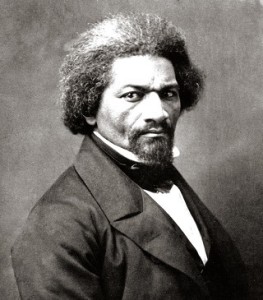The Legacy of Frederick Douglass

If there is no struggle, there is no progress.
Power concedes nothing without a demand. It never did and it never will.
It is easier to build strong children than to repair broken men.
Those who profess to favor freedom, and yet depreciate agitation, are men who want crops without plowing up the ground.
People might not get all they work for in this world, but they must certainly work for all they get.
I prefer to be true to myself, even at the hazard of incurring the ridicule of others, rather than to be false, and to incur my own abhorrence.
Without a struggle, there can be no progress.
I prayed for twenty years but received no answer until I prayed with my legs.
No man can put a chain about the ankle of his fellow man without at last finding the other end fastened about his own neck.
It is not light that we need, but fire; it is not the gentle shower, but thunder. We need the storm, the whirlwind, and the earthquake.
The parallels to today’s world and its ongoing quest for environmental and social justice are obvious. In particular, it’s incumbent on all of us who care about this stuff to “agitate” in some meaningful sense of the word.
Has my somewhat “radical” stance on these matters cost me some clients? Without a doubt. Does that concern me? Not in the least—and I’m sure most of you reading these words conduct your lives in the identical manner. As I like to say, “My integrity is not for sale.” I’m sure you feel the same.

I quite like the quotes you’ve selected. Here’s an expanded version of one of them that I like especially:
“Power concedes nothing without a demand. It never did and it never will. Find out just what any people will quietly submit to, and you have found out the exact measure of injustice and wrong which will be imposed upon them, and these will continue till they are resisted with either words or blows, or both. The limits of tyrants are prescribed by the endurance of those whom they oppress.”
I also share a particular affinity with being true to one’s self at risk of others’ ridicule, rather than self-abhorrence for falsehood.
I’ve heard it put a little differently as well – “Be yourself and the people who love you will love who you are, and not what you pretend to be.” Also – “Be yourself. If you’re not yourself, you aren’t anyone.”
I’m reminded of Emerson’s essay “Intellect” where he wrote the following (with which I find much fellowship):
“God offers to every mind its choice between truth and repose. Take which you please, you can never have both. Between these, as a pendulum, man oscillates.
“He in whom the love of repose predominates will accept the first creed, the first philosophy, the first political party he meets, most likely his father’s. He gets rest, commodity, and reputation; but he shuts the door of truth.
“He in whom the love of truth predominates will keep himself aloof from all moorings, and afloat. He will abstain from dogmatism, and recognize all the opposite negations, between which, as walls, his being is swung. He submits to the inconvenience of suspense and imperfect opinion, but he is a candidate for truth, as the other is not, and respects the highest law of his being.”
So, between awareness, and a life of ease, you and I chose to know, and we are therefore necessarily remote from indolent ignorance.
Here’s another thought: The opinions of those who ridicule you are manifestly unworthy of consideration.
Constructive and compassionate criticism is of one kind, while ridicule is of quite another. The words of those who intend harm don’t warrant the respect of attention, beyond that required to dismantle them.
Obviously, not all will take the side of truth. Those of us who do – while we may choose widely diverse paths – will eventually arrive the same destinations.
I’ve come to believe that any path toward truth must include a balance of heart and mind. Heart without mind is lost – impulsive and impractical. Mind without heart is damned – coldblooded and fruitless